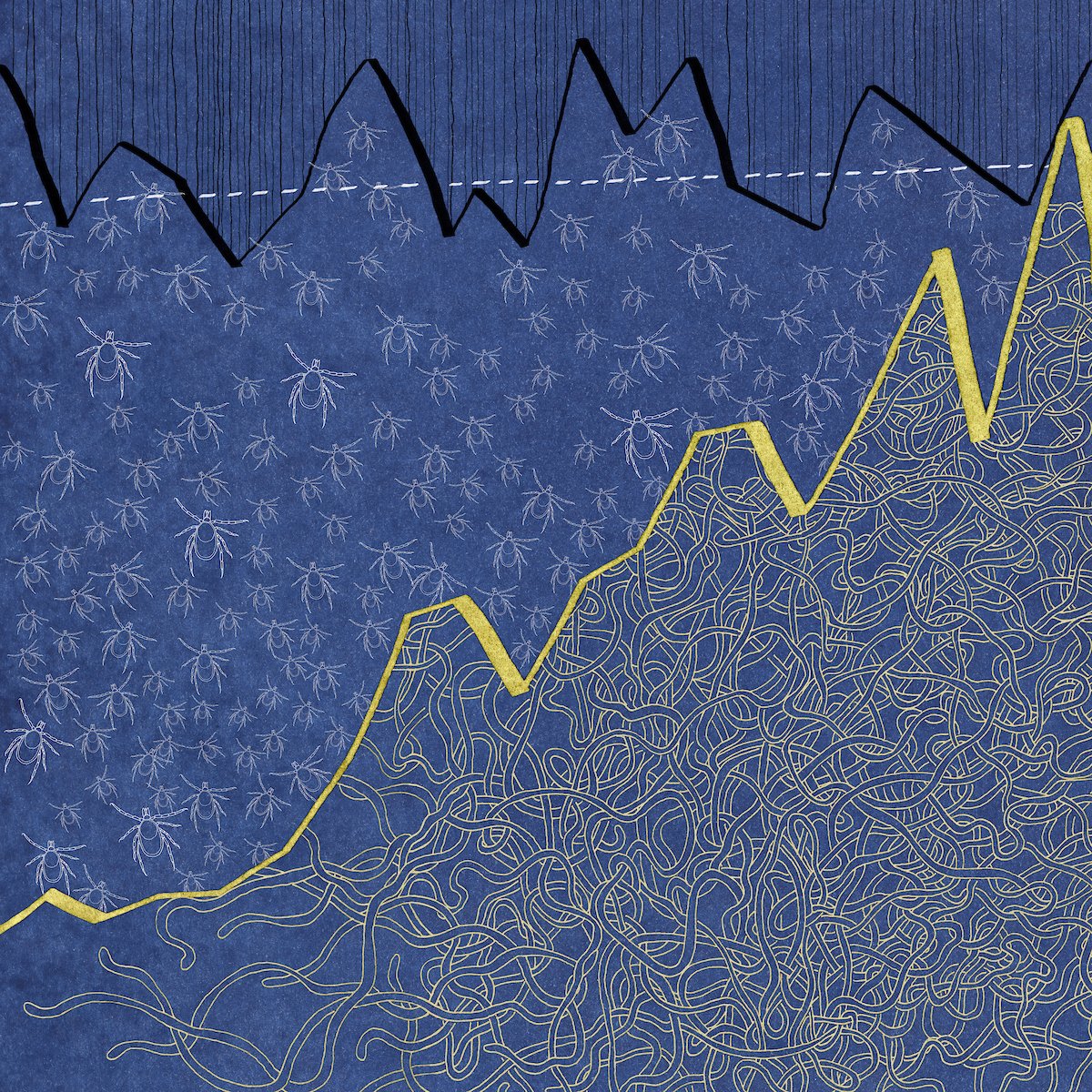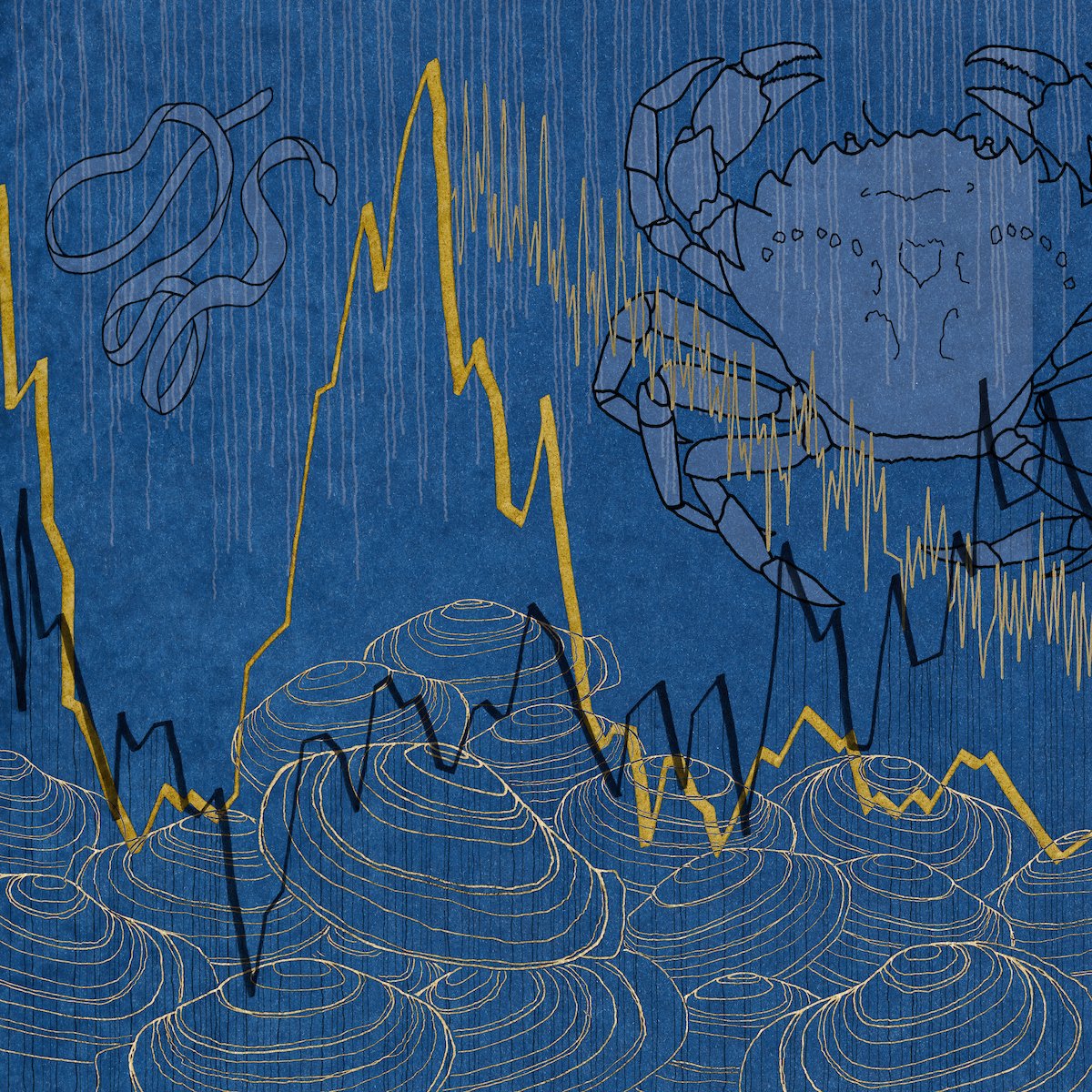Spring 2022
From the Executive Director, Raney Bench
You’re going to be seeing a lot more of us this summer, thanks to an ambitious series of outdoor programs we’re hosting each month. If you’ve seen Jennifer Steen Booher’s original artwork in this edition of Chebacco: Imagining What If… then you have an idea of the amazing work we’re planning in our museum-without-walls series called We Change With Them. Portable banners of Jen’s work will be popping up at the Somesville Museum, the MDI BioLab, Naturalist’s Notebook, ArtWaves, and more, thanks to a grant by the Maine Humanities Council. Jen’s artwork serves as an entry point for people to learn more about changes taking place around us due to climate change, challenging us to imagine “what if…” we don’t act?
Our dedicated team is small but mighty! I’m always impressed at the interesting and excellent work Jenna, Leah, and Patrick are able to accomplish, surprising many people by all the ways we exceed expectations of a small historical society. Now that we’re growing, we could use some more volunteers to help us set up and support events, or work with the collections. Please let me know if you are interested in learning more.
Schoodic Institute image.
Landscape of Change early results
In April 2021 the Society launched Landscape of Change, a collaborative project with Schoodic Institute, the Mount Desert Island Biological Laboratory, College of the Atlantic, A Climate to Thrive, and Acadia National Park using historic records to document change over time to birds, pollinators, climate, and sea level. Throughout last summer, community scientists helped record new observations, which over the course of the winter were compared with historic observations to understand the speed, scale, and scope of change taking place on Mount Desert Island.
Thanks to Schoodic scientists, the analysis is in! To learn more about which bird and pollinator species are declining or on the rise, and what’s happening to our climate and sea level, check out the video for MDI BioLab’s recent Science Cafe on YouTube: https://youtu.be/l6Npn2snXI8. Catherine Schmitt, Science Communication Specialist for Schoodic Institute, Raney Bench, Executive Director for the Historical Society, and Johannah Blackman, Director of A Climate to Thrive present the first year results of this ongoing study and talk about how the data can be used to inform community solutions, conservation efforts, and climate change strategies.
Vintage Classroom
Vintage Classroom is an immersive program offered each spring to all third grade students in our district. Evoking the strict discipline of an 1890s classroom gives students a glimpse of the divided gender roles and rules of respect for authority expected at the time. Contrasting this with a modern classroom where students are the center of their learning experience gives them an appreciation of the changes enacted to create a more inclusive and nurturing learning environment. But, it’s not all hard work - actors from Barn Arts Collective introduce hilarious characters that educate and delight students, making a fun experience that children remember for years to come. In May, we welcomed a total of 65 students to the Sound Schoolhouse.
New traveling exhibit and speaker series
In 2021, local artist Jennifer Steen Booher identified six changes she observed taking place around her: the collapse of shrimp populations and the influx of squid due to warming seas; colonization of oysters into island bays and harbors; species that cause public health issues, like browntail moth caterpillars and ticks; invasive species that impact traditional Maine fisheries, like green crabs on clams; and threats to anadromous fish due to extreme weather events.
After intensive research, she layered cyanotype, drawings, and data to tell the story of these local climate-related phenomena, creating a six-image series that explores shifting ecosystem dynamics resulting from climate change in the Gulf of Maine. Booher was shocked by the immediacy of the changes she observed: ”I thought I understood climate change, but the complexity I found during this project was humbling.”
We Change With Them, Booher’s artwork and article, were published in the new edition of Chebacco, the Historical Society’s annual journal, and Booher appeared on Chebacco Chats in April to provide some behind-the-scenes photographs and stories, such as handling a dead alewife fish while her daughter took pictures.
With the generous support of the Maine Humanities Council and Bar Harbor Bank & Trust, the Historical Society created a traveling exhibit and speaker series to bring We Change With Them to museums-without-walls in the community. Scientists, public health experts, historians, and Booher will be available to answer questions and share the work being done to document and respond to climate change. All images in the series will be available for viewing. The exhibit and speaker series are part of the award-winning Landscape of Change project.
Visit these Museums Without Walls:
Changes in our wetlands and Alewives updates
Thursday, June 23, 4:00 - 6:00 p.m.
Billy Helprin, Somes Meynell Wildlife Sanctuary
Somesville Museum, Oak Hill Road, Somesville
Marine Ecosystems: Green Crabs, Eelgrass, Ribbon Worms
Wednesday, July 6, 4:00 - 6:00 p.m.
Jane Disney, MDI Biological Laboratory
Family Science Night
MDI Bio Lab Lower Campus, Salisbury Cove
Naturalist’s Nightmares: Browntail moths and Deer ticks
Thursday, August 4, 2:00 - 4:00 p.m.
***RAIN DATE: Friday, August 5, 2:00 - 4:00 p.m.
Angela Mech and Allison Gardener, University of Maine
The Naturalist’s Notebook, Seal Harbor*
Populations: Oysters, Shrimp, and Squid
Thursday, September 29, 4:00 - 6:00 p.m.
Catherine Schmitt, Schoodic Institute
ArtWaves, 1345 Route 102, Town Hill
We Change With Them exhibit closer
October date and location TBD
*Subject to change. Please check our the program series page for final details. www.mdihistory.org/wechangewiththem.
From the Collections - by Patrick Callaway, Collections Coordinator
With the increasing economic difficulties we see in 2022, historians are drawn to the past to see what (if any) steps were taken to help people in unfortunate circumstances. As we saw in the “From the Collections” column in the last newsletter, poor relief was an intensely local matter in the 19th century. This had potential advantages and disadvantages for the folks suffering from reduced circumstances. While Jacob Lunt (who we met last time) was able to appeal to the town of Mt. Desert as a citizen and have the reasonable expectation of relief, not everyone was as fortunate. In this From the Collections, we see another letter involving the Mt. Desert Overseers of the Poor.
This letter was written to the Palmyra Overseers of the Poor in January 1864 by the Mt. Desert overseers, making this more of an administrative letter than the letter of supplication we see in the Lunt case. However, we are able to see a number of overlaps between the two.
This letter sees the case of the Fogg family, legal inhabitants of Palmyra but present in Mt. Desert. The letter does not indicate who Harrison Fogg is, what business that he might have had on the island, or his fate. The family “having fallen into distress” of an unspecified nature was in need of immediate help, which the town of Mt. Desert grudgingly provided. In this letter, the Mt. Desert committee demanded that the Palmyra committee not only “remove said paupers” from the town of Mt. Desert (or provide for their upkeep) but also reimburse the town for the expenses already incurred for their care. This response to poverty drew on centuries old concepts of vagrancy and vagrancy laws designed to police the poor in order to prevent ‘the unworthy poor’ or outsiders to the community becoming a public charge. It is also an interesting commentary on the idea of community- and who could or could not claim the benefits of membership in the community in the 1860s.
Digital Archives update
The Society is a member of the History Trust, a collaboration of organizations that care for historic collections around the region, working together to make those collections freely accessible through a digital archive. We use specialized museum software to manage our archive and object collections, which requires a custom tool designed to export our files to the Digital Archive. As part of the process, the Society needed to make corrections and clarifications to many of our records before they could be exported, so we hired two specialists to help complete this work. Thanks to the leadership of Pauline Angione who trained the specialists, and to George Soules at AvantLogic who created the Digital Archive, we were able to export over 16,000 records! Now anyone can see photographs, read documents, and check out objects from our collection on our website, or they can go to the Digital Archive where the records are cross-referenced with our partner organizations. It’s a powerful research tool for anyone who wants to learn more about local history, businesses, families, and events.
Ours Again: Remembering Winter (1920-2020), the History Trust’s latest virtual exhibit, showcases items from the digital collections of all fourteen member organizations, plus two local libraries. Visit www.historytrust.org to view the exhibit and learn more about this collective of organizations stewarding local history.
Chebacco and Chebacco Chats
This past April, we published our 23rd volume of Chebacco - it includes thirteen articles that consider “what was” and “what if…,” with topics such as British plans for Downeast Maine in 1775-1815; the last days of the Quietside canneries; and what happened to the third Carriage Road gatehouse.
Before Chebacco’s release, we produced and aired eight episodes of Chebacco Chats, Season Three, to complement it. Jenna Jandreau and Raney Bench of the Society hosted chats with Jennifer Steen Booher, Roberto Rodriguez, Betsy Hewlett, and Sean Cox, and we partnered up with Southwest Harbor Public Library to commemorate community historian Ralph Stanley (1929-2021).
One Chebacco Chats viewer wrote in a survey, “So enjoyable as well as educational. Keeps me connected to a place that I love.”
Check out www.mdihistory.org/chebacco-chats for links to episodes. Chebacco Chats will return in the fall with chats by Bill Horner on the Gilded Age of yachts, Natalie Springuel on the history of net-pen salmon farming in Maine, and more. To purchase a copy of Chebacco, visit www.mdihistory.org/chebacco.
Landscape of Change wins prestigious award
The American Association for State and Local History (AASLH) has selected Mount Desert Island Historical Society and Landscape of Change for an Award of Excellence in the association’s Leadership in History Awards. The AASLH Leadership in History Awards is the nation’s most prestigious competition for recognition of achievement in state and local history. The American Association for State and Local History (AASLH), a national nonprofit association, provides leadership and resources to help the history community thrive and make the past more meaningful for all people. AASLH serves the tens of thousands of history organizations, professionals, and volunteers around the country who help people of all ages develop critical thinking skills and understand how learning history helps society make progress toward justice. The 2022 AASLH awards will be presented at a special reception in September in Buffalo, NY.
Save The Date
Annual Meeting
August 2: 5:00 - 6:00 p.m.
The Society has changed a lot over the past decade, under the thoughtful leadership of Bill Horner as board president. Although he will remain on the board, Bill is retiring as president. During this virtual meeting, Raney Bench and Bill will be joined by incoming board president, Ben Pierce, to have a conversation about the Society’s growth and our thoughts for the future.
“Designing America”
August 18, 5:00 - 7:00 p.m.
Join us at College of the Atlantic’s Gates Auditorium for a talk by historian and filmmaker Laurence Cotton on the remarkable life and career of Fredrick Law Olmsted - writer, philosopher, social reformer, advocate for the preservation of natural scenery, and creator of some of North America’s most beautiful parks and gardens. Jenna Jandreau of the Historical Society will conclude the program with a short talk on Olmsted’s landscaping project at George Vanderbilt’s estate Point D’Acadie, and the work of his firm in creating some of the landscapes we love on the island today.







